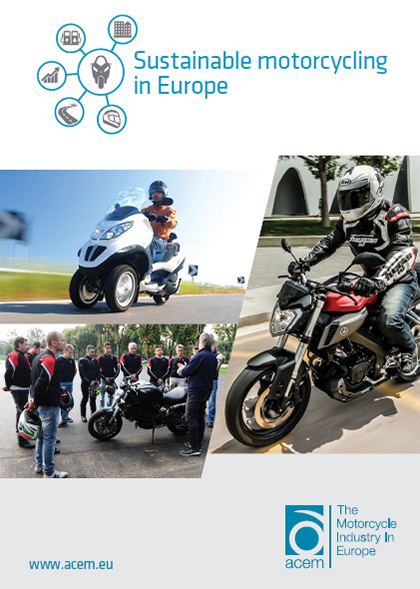 Europe – At the European Association of Motorcycle Manufacturers’ (ACEM) 13th annual conference, hosted today in Brussels, the ACEM President Stefan Pierer and CEO of the Austrian motorcycle manufacturer KTM said, “We urgently need clarity from the EC (European Commission) regarding the implementation of Euro 5”.
Europe – At the European Association of Motorcycle Manufacturers’ (ACEM) 13th annual conference, hosted today in Brussels, the ACEM President Stefan Pierer and CEO of the Austrian motorcycle manufacturer KTM said, “We urgently need clarity from the EC (European Commission) regarding the implementation of Euro 5”.
In a full statement Stefan Pierer stated, “Our industry is committed to sustainability, which we understand as a complex process related to environmental performance of vehicles, road safety and economic viability of our operations”.
“Since 1999, our sector moved from the Euro 0 to the Euro 4 standard. Carbon monoxide emissions were reduced by 91%. Nitrogen oxide and carbon emissions considered together went down by 92%. Even more, this reduction in limit values took place at the same time that new and more stringent testing procedures were introduced in European legislation”.
“In the coming months, we will start working on the implementation of the future Euro 5 environmental standard. However, manufacturing vehicles requires complex planning and we urgently need clarity from the European Commission regarding the technical content and implementation timeline of Euro 5”
These will be the future bikes that will be required to fit into stringent emission zones to be enabled across Europe’s cities. This will allow riders to continue to buy and ride congestion busting motorcycles that also fit within the ideals of an ever increasing environmentally friendly, zero intolerant combustion engine world. Well that’s our thoughts on the topic!
The Event – Conference – ACEM Reports
The event, titled ‘Sustainable motorcycling in Europe”, attracted more than 250 attendees from all over Europe, representing businesses, representatives from the European Commission, the European Parliament, Member States, NGOs and other organisations. The discussions addressed the role of the motorcycle industry in the sustainability of transport in Europe.
Antti Peltomäki (Finnish), Deputy Director-General of the European Commission’s Directorate General for internal market and industry (DG GROW) said: “The motorcycle industry is undergoing similar structural changes to the ones we see in other European industries. In our recent industrial policy communication we looked into how Europe’s industrial sector can become smarter, cleaner, more sustainable and, at the same time, gain a competitive edge. We must remember that road transport still represents about 25% of Europe’s greenhouse gas emissions”.
Bernd Lange (German), member of the European Parliament: “For the urban side, we may see an increase in electrification. On the leisure side, however, the picture is different. Lots of motorcyclists like the idea of having vehicles with conventional engines. Here we need to guarantee that leisure motorcycles have the same emissions limits than cars”.
 In his concluding remarks, ACEM Secretary General Antonio Perlot, said:
In his concluding remarks, ACEM Secretary General Antonio Perlot, said:
“Motorcycles are part of today’s mobility and will continue to be so in the future. They are an answer to the mobility needs of people, particularly in urban settings, as shown by the fact that today there are about 35 million mopeds and motorcycles on Europe’s roads”.
“Regarding the future Euro 5 step it is essential that policy-makers create a clear and predictable legislative framework for the industry to plan its manufacturing operations”.
The motorcycle sector, for its part, has a forward-looking vision and will continue to invest in R&D and new and advanced safety technologies. We will also work with our counterparts in the EU institutions to secure further improvements in areas such as transport emissions and road safety”.
Vehicle exhibition of new technologies
During the ACEM conference several European and international brands showed some of their latest models and prototypes.
The members of the RESOLVE consortium whose objective is to develop affordable, energy efficient and comfortable electric vehicles ideal for daily urban commuters, presented two electric prototypes, a three-wheeler and a light quadricycle. The project was funded by the EU with 6.8 M euros from the European Horizon 2020 programme. It involves several European companies including Austrian motorcycle manufacturer KTM and the Italian company PIAGGIO.
The members of the Connected Motorcycle Consortium (CMC), the R&D platform to foster cooperation in research and development in the field of cooperative intelligent transport systems (C-ITS) exhibited some of their latest vehicles. The CMC, which is open to a wide range of organisations including motorcycle OEM, automotive companies, automotive part suppliers and research institutions, aims promote timely and comprehensive use of C-ITS systems offering the potential to improve safety for motorcyclists.
We wish we were there, certainly our invitations came through. Shame we were busy. Maybe by this time next year we will back to resume the trail of conferences, face to face interaction and of course a “walking lunch” where opinions really count!
Original Source – Acem
View Conference Documents – Conference documents


Leave a Reply